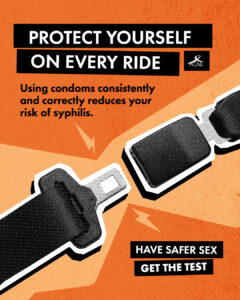Syphilis
Syphilis is a sexually transmitted bacteria that spreads through vaginal, anal and/or oral sex. It can also spread through sharing equipment used for injecting drugs.
- Syphilis is known as “the great imitator” and can have a variety of different symptoms, or none at all.
- Syphilis never goes away without treatment, even when symptoms subside, and if left untreated can cause severe disease.
- A pregnant person with syphilis can pass it on to their unborn child, sometimes causing birth defects or death. This is known as congenital syphilis.
Symptoms
Many people have no symptoms at all but can still transmit syphilis and are at risk for complications. Syphilis infection occurs in three stages:
- Primary syphilis (three days – three months after contact): A painless sore (chancre) appears in the genital and/or anal, or mouth area. The sore may heal without treatment within two to six weeks. Syphilis in this stage is highly infectious.
- Secondary syphilis (six weeks – six months after contact): After the appearance of the initial chancre sore other symptoms may develop, such as a rash on the chest or back and/or on the soles of feet and palms of hands, swollen glands, weight loss and a general feeling of being unwell.
- Tertiary syphilis (two – 30 years or more after contact): Can occur following an untreated infection causing serious health problems to the brain, heart and skin, and can lead to death.
- Neurosyphilis: At any stage, the bacteria can travel through the body and reach the brain and spinal cord. Symptoms of this stage can include ringing in the ears, headache, decreased hearing and/or decreased vision.
Did you know?
- If you have syphilis, you are at a greater risk of contracting HIV.
- If you already have HIV, syphilis can be highly aggressive.
Testing and Treatment
The only way to know if you have syphilis is to get tested!
If detected early, syphilis can be treated and cured with a long-acting antibiotic injection. If left untreated, syphilis can cause permanent damage to the brain, heart and other organs and can be fatal. Getting tested for syphilis requires a blood test. More information on getting tested is available on the Get Tested, STBBIs page.
Prevention

To reduce your risk of getting syphilis, follow these practices:
- Talk about STBBIs and safer sex options with every partner to ensure that you protect one another.
- Use a condom and/or oral dam properly and consistently each time you are sexually active.
- See your health-care provider or go to a sexual health clinic to be tested for STBBIs if you are sexually active or starting a sexual relationship with a new partner.
- You and your partner should be tested for STBBIs before becoming sexually active and then again in three to six months.
- Avoid sharing contaminated needles and use new equipment to inject drugs. For information on getting clean needles, call the Harm Reduction Clinic at 709-777-1761.
- Post-exposure prophylaxis (doxy-PEP) is a way to help prevent the transmission of syphilis for people who may have been exposed to the bacteria through contact with blood or bodily fluids. It involves taking a medication within 24 hours, but no later than 72 hours after sexual activity. For more information on doxy-PEP, check out CATIE: doxy-PEP or talk to your health-care provider.
Testing is available through the following:
- Make an appointment with your health-care provider.
- Contact Planned Parenthood — NL Sexual Health Centre at 1-877 NO MYTHS (666-9847) or 709-579-1009
- Medicuro Virtual Health Clinic
- Virtual health care offered by health-care providers in Newfoundland & Labrador.
- Eastern-Urban Zone:
- Contact the Sexual Health Clinic at sexualhealthclinic@easternhealth.ca (NLHS Eastern-Urban Zone)
- Contact the community walk-in clinic at 709-777-1706
- Labrador-Grenfell Zone:
- Point of Care Testing for Syphilis and HIV are available in the following locations:
- Nain Community Clinic, 28 Ikajuktauvik St. – (709) 922-2912
- Natuashish Community Clinic, 82 Katshinak St. – (709) 478-8842
- Hopedale Community Clinic, 16 Centre St – (709) 933-3857
- Makkovik Community Clinic, 42-50 Moravian St. – (709) 923-2229
- Postville Community Clinic, 3 Park Dr. – (709) 479-9851
- Rigolet Community Clinic, 7 Riche’s Seashore Dr. – (709) 947-3386
- Mani Ashini Community Clinic, North West River/Sheshatshiu, 193 Shimun St. – (709) 497-8351
- For all other locations, please contact your local community clinic or health centre.
- Find your nearest testing site: Know More, Test More, Aids Committee of NL
Other services related to this information:
- Contact your Public Health Nurse.
- 811 HealthLine (Newfoundland & Labrador) – Call 811 or 1-888-709-2929 / TTY 1-888-709-3555
- For information on doxy-PEP: CATIE doxy PEP
- Safe Works Access Program (SWAP), AIDS Committee of Newfoundland and Labrador (ACNL)

